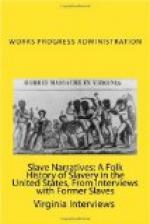Uncle George said that food was always plentiful on the boats. Passengers and freight were crowded together on the decks. At night there would be singing and dancing and fiddle music. “We roust-abouts would get together and shoot craps, dance or play cards until the call came to shuffle freight, then we would all get busy and the mate’s voice giving orders could be heard for a long distance.”
“In spite of these few pleasures, the life of a roust-about is the life of a dog. I do not recall any unkindnesses of slavery days. I was too young to realize what it was all about, but it could never have equalled the cruelty shown the laborer on the river boats by cruel mates and overseers.”
Another superstition advanced itself in the story of a boat, told by Uncle George Arnold. The story follows: “When I was a roust-about on the Gold Dust we were sailing out from New Orleans and as soon as we got well out on the broad stream the rats commenced jumping over board. ’See these rats’ said an old river man, ’This boat will never make a return trip!’”
“At every port some of our crew left the boat but the mate and the captain said they were all fools and begged us to stay. So a few of us stayed to do the necessary work but the rats kept leaving as fast as they could.”
“When the boat was nearing Hickman, Kentucky, we smelled fire, and by the time we were in the harbor passengers were being held to keep them from jumping overboard. Then the Captain told us boys to jump into the water and save ourselves. Two of us launched a bale of cotton overboard and jumped onto it. As we paddled away we had to often go under to put out the fires as our clothing would blaze up under the flying brands that fell upon our bodies.”
“The burning boat was docked at Hickman. The passengers were put ashore but none of the freight was saved, and from a nearby willow thicket my matey and I watched the Gold Dust burn to the water’s edge.”
“Always heed the warnings of nature,” said Uncle George, “If you see rats leaving a ship or a house prepare for a fire.”
George W. Arnold said that Evansville was quite a nice place and a steamboat port even in the early days of his boating experiences and he decided to make his home here. He located in the town in 1880. “The Court House was located at Third and Main streets. Street cars were mule drawn and people thought it great fun to ride them.” He recalls the first shovel full of dirt being lifted when the new Courthouse was being erected, and when it was finished two white men finishing the slate roof, fell to their death in the Court House yard.
George W. Arnold procured a job as porter in a wholesale feed store on May 10, 1880. John Hubbard and Company did business at the place, at this place he worked thirty seven years. F.W. Griese, former mayor of Evansville has often befriended the negro man and is ready to speak a kindly word in his praise. But the face of John Sims still presents itself when George Arnold is alone. “Never do anything to hurt any other person,” says he, “The hurt always comes back to you.”




